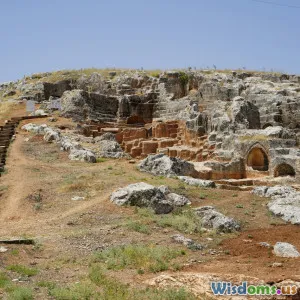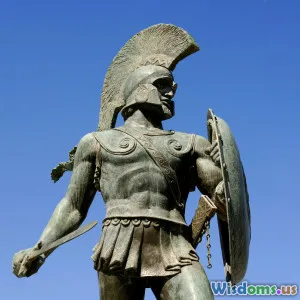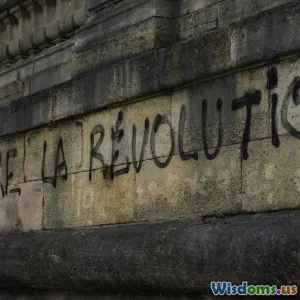
What If the Trojan War Never Happened Facing the Evidence
9 min read Exploring the impact of the Trojan War's historicity on mythology, archaeology, and culture. (0 Reviews)
What If the Trojan War Never Happened? Facing the Evidence
The Trojan War has long been an indelible part of Western mythology, stemming from ancient Greek epics like Homer's Iliad. For centuries, this legendary conflict has fascinated historians, poets, and archaeologists alike, forming a cornerstone in discussions of history and myth. But what if the Trojan War, as vividly depicted in literature and lore, never actually occurred?
Delving into this question invites us not only to reconsider ancient narratives but also to explore the delicate interplay between myth and history. This article navigates through tantalizing clues, archaeological discoveries, and scholarly debates to provide an in-depth look at what the implications might be if the Trojan War was purely mythological.
The Trojan War in Myth and History: Setting the Stage
The Trojan War is the setting for some of the most renowned narratives in Western literature, portraying a ten-year siege of the city of Troy by a coalition of Greek states. Central to these stories are the abduction of Helen—the "face that launched a thousand ships"—the heroic feats of Achilles, Hector's valiant defense, and the cunning stratagem of the Trojan Horse.
But despite its cultural significance, the historicity of the Trojan War has always been contentious. Ancient texts like the Iliad blend divine intervention with historical events, complicating efforts to extract factual information. Yet, the epic's existence and vivid storytelling have led many to believe the war must be based on a kernel of truth.
Archaeological Evidence: Did Troy Exist?
The quest to find Troy gained momentum in the 19th century when Heinrich Schliemann, inspired by Homer’s narratives, excavated in Hisarlik, in modern-day Turkey. Schliemann claimed to have uncovered a city that matched Troy’s description, initiating decades of research. Subsequent excavations identified multiple settlement layers, with Troy VI and Troy VIIa most often associated with destruction and potential warfare event around the Late Bronze Age (~1250 BCE).
However, linking these archaeological layers definitively to the Homeric Trojan War is challenging:
- No direct written records from the period explicitly mention a Greek siege similar to the epic.
- Destruction layers may point to battles or natural disasters, but their exact causes remain speculative.
- The city size and artifact evidence show Troy was an important cultural and commercial hub, but not necessarily the site of a massive warfare as depicted.
Thus, while Troy likely existed and experienced violent episodes, the scale and precise nature of these events are far from confirmed.
Literary Analysis: Myth, Memory, and Oral Tradition
Scholars argue that, even if the Trojan War did happen, the Iliad and related myths are part of a complex oral tradition. Oral histories circulate community memories, blending fact with embellishments, symbolic motifs, and cultural values.
Some points to consider:
- Mythical elements like gods directly influencing battles may symbolize interpretations of fate and human endeavor rather than literal beliefs.
- The Iliad emphasizes themes of honor, mortality, and heroism rather than historical accuracy.
- Many Greek city-states held varying stories and different versions of events, reflecting regional politics and societal ideals instead of uniform history.
In this light, the Trojan War narrative can be seen as a cultural mirror rather than an accurate battlefield report.
What If the Trojan War Never Happened?
If modern historians conclude that the Trojan War was purely mythical or more loosely inspired by a series of conflicts and natural catastrophes rather than a single decisive battle, significant implications arise.
Impact on Historical Understanding
Our understanding of Late Bronze Age interactions between Greek kingdoms, Anatolian states, and others would shift from a war-centric perspective to a more nuanced picture of diplomacy, trade, migration, and smaller-scale conflicts.
- Broader regional dynamics: Scholars might pay more attention to economic exchange and political alliances when interpreting archaeological findings.
- Re-examining Mycenaean culture: The focus would rely less on military conquest and more on social, religious, and technological developments.
Influence on the Study of Mythology
The Trojan War, as a mythological construct, is foundational in understanding how societies encode values, fears, and collective identities.
- Rejecting a historical Trojan War could highlight the power of oral traditions to shape cultural memory, emphasizing how myths serve purposes beyond record-keeping.
- It might accelerate comparative studies showing how war legends function across civilizations to legitimize political power or explain social phenomena.
Cultural and Literary Repercussions
The Trojan War is inseparable from classical education, literature, and even modern pop culture. So, dismissing its historicity might provoke discourse on:
- The role of myth versus history in educational curricula.
- How much modern narratives depend on ancient inspiration, regardless of factual basis.
- Artistic adaptations (films, novels, games) may lean further into creative retellings emphasizing themes rather than historical details.
Real-World Lessons: Embracing Myth and History
Even if the Trojan War in its classic form did not happen, its existence in the cultural imagination offers valuable insights:
- The blending of myth and evidence encourages critical thinking and interdisciplinary research.
- It reminds us that history is not just facts but also narratives shaped by human perspectives.
- The enduring legacy of the Trojan War underscores how storytelling sustains cultural identity across millennia.
As the scholar Gregory Nagy eloquently noted, "The Homeric epics preserve a poetic record of a society both historically real and imaginatively eternal." This dual nature exemplifies that myths need not be historically factual to be profoundly true in human experience.
Conclusion
An absolute proof that the Trojan War never happened remains elusive, but facing the evidence invites us to rethink our assumptions about history and myth. Instead of deeming myth as mere falsehood, this closer look reveals how legends intermingle with archaeological discoveries and historical theorizing.
Whether the Trojan War is a factual episode etched in time or a grand poetic invention, its impact on culture, identity, and scholarship is undeniable. Embracing this complexity enriches our appreciation for the past and enhances our understanding of how stories shape civilizations.
Ultimately, pondering "what if the Trojan War never happened" transforms from a quest for truth into a deeper inquiry into the human need to narrate, symbolize, and interpret our shared history.
References and Further Reading:
- Korfmann, M. (2001). “Troy and Homer: Toward the Archaeology of Homeric Epics.” Oxford Journal of Archaeology, 20(3), 279-295.
- Nagy, G. (1999). The Best of the Achaeans: Concepts of the Hero in Archaic Greek Poetry. Johns Hopkins University Press.
- Bryce, T. (2006). The Trojans and Their Neighbours. Taylor & Francis.
- Cline, E.H. (2014). 1177 B.C.: The Year Civilization Collapsed. Princeton University Press.
Explore more to navigate the fascinating terrains that link myth, history, and the imagination.
Rate the Post
User Reviews
Popular Posts

















